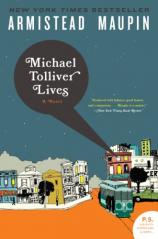Michael Tolliver Lives
Review
Michael Tolliver Lives
Armistead Maupin's Tales of the City novels have
achieved a kind of infamy since their original publication as
serialized fiction in the San Francisco Chronicle newspaper.
Spanning the freewheeling, sexually open 1970s and extending into
the more sober 1980s, with that decade's awakening to the realities
of the AIDS crisis, the series was later turned into a miniseries
that was banned on many PBS channels due to its nudity. Indeed, the
series's frankness about sex, and its openness about gay sex in
particular, is part of what fueled its initial popularity.
But beyond its risqué subplots and often over-the-top
storylines, the series's popularity could also be explained by its
realistic portrayal of a group of close-knit friends living in the
relaxed, permissive society of San Francisco in the 1970s. Readers
who came to know Mona, Mrs. Madrigal, Brian, Mary Ann and the rest
of the inhabitants of 28 Barbary Lane were inevitably drawn into
their joys and sorrows, particularly when later books in the series
took on a more somber tone.
Almost everyone's favorite character in the books is Michael
"Mouse" Tolliver, a young gay man from Florida who has moved to San
Francisco to escape his fundamentalist roots. Over the course of
the first six books in the series, Michael entered a jockey shorts
dance contest, fell in love (and lust) more than once, came out to
his parents, lost his lover to AIDS and discovered that he himself
was HIV-positive.
Fast forward to the 2000s, when, thanks to powerful drug cocktails,
Michael has come to terms with his HIV status and is not just
surviving but flourishing. The novel's first-person narration gives
this book an autobiographical feeling, especially for those readers
familiar with Maupin's own biography. United in a City Hall
marriage to Ben, a man 20 years his junior, Michael has finally
discovered the kind of stable, long-term relationship that has
eluded him most of his life. Sure, he has doubts about how his
young husband will handle the future effects of aging on
Viagra-popping Michael. But, for now, he is content with his
marriage, with his friends and with his work as a gardener.
Among those friends are some who will be familiar to readers who
have been frequent visitors to 28 Barbary Lane --- particularly
Brian and Mrs. Madrigal (who no longer resides at that legendary
address but who has found a way to surround herself with a new sort
of community) --- as well as some new faces. Readers will
particularly delight in former ladies' man Brian's relationship
with his daughter, a young journalist whose experiential
examination of the city's sexual diversity has her father feeling
like an old fuddy-duddy. There are some surprises --- happy and sad
--- about these old friends, too.
Michael's biggest crisis in this new novel is the impending death
of his mother, terminally ill with emphysema in a Florida nursing
home. Michael's homosexuality has been the source of contention in
their relationship, and his mother's illness causes Michael to
reflect on his relationship with his parents and with his brother
Irwin. Daring to take Ben along on a final visit to Florida,
Michael confronts many of the skeletons in his family's closet ---
and unclothes a few new ones as well.
MICHAEL TOLLIVER LIVES has a finality about it, especially
when Michael loses the person who has always felt like his real
mother. But this ending, like Michael's life, turns out to be
neither somber nor tragic --- instead, older, wiser and very much
alive, Michael's story brings a note of hopeful optimism to the
culmination of this beloved series.
Reviewed by Norah Piehl on January 7, 2011
Michael Tolliver Lives
- Publication Date: June 1, 2008
- Genres: Fiction
- Paperback: 320 pages
- Publisher: Harper Perennial
- ISBN-10: 0060761369
- ISBN-13: 9780060761363




